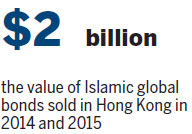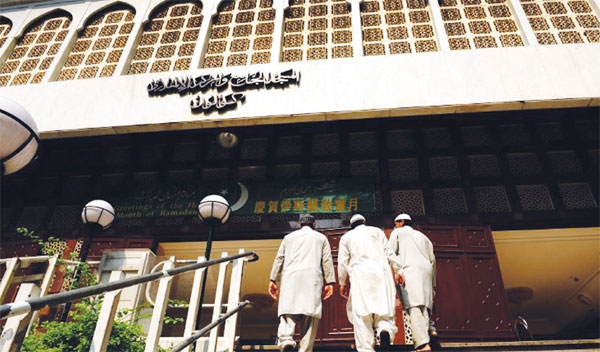HK on sukuk bandwagon ahead of Silk Road revival
Updated: 2016-03-02 08:13
By Bloomberg in Hong Kong(HK Edition)
|
|||||||||
|
Muslims in Hong Kong enter a mosque in Kowloon. As the SAR is in a strategic position to access China's large Muslim population, it needs stronger efforts to harness investor demand and improve liquidity, experts says. Asia News Photo |
Hong Kong's possible third Islamic global bond in three years brings it closer to Indonesia and Malaysia in terms of sovereign sukuk presence, a boost to the market that coincides with the nation's Silk Road revival.
The finance center has already raised $2 billion from sales in 2014 and 2015, which attracted $6.7 billion in total orders, while Indonesia plans to tap investors for the sixth year running and Malaysia is returning for its seventh offering. While the city only has 270,000 people following the teachings of the Koran, it's positioning itself as a vital port and financing hub for China's Belt and Road Initiative policy announced by President Xi Jinping in 2013.
"The announcement is a great sign of Hong Kong's continued wish to be at the center of people's minds when it comes to Islamic financing in Asia, particularly as momentum builds around (the nation's) Belt and Road Initiative," said Davide Barzilai, Hong Kong-based head of Islamic finance for Asia Pacific at law firm Norton Rose Fulbright. "We will find that Islamic-compliant investors will see the attractions."
Hong Kong, which is losing its role as a gateway to the mainland as Shanghai's financial market opens, is keen to become the launch pad for the global ambitions of mainland companies, including building roads, railways and ports along the traditional Silk Road to the Middle East, Africa and Europe. While the SAR is making progress after putting in legislation for Shariah-compliant bonds in 2013, Singapore's aspirations are stalling, highlighting the difficulties posed to countries or cities with small Muslim communities.

The city is considering selling a third sukuk, Financial Secretary John Tsang Chun-wah said in Budget comments, brightening the outlook after a 29-percent slump in global issuance in 2015 from $49.6 billion the previous year, when the UK, Luxembourg and Hong Kong sold such debt for the first time.
This year is off to a better start, with $5 billion in worldwide sales compared with $1.8 billion a year earlier, data compiled by Bloomberg show. Kenya, Nigeria, Ghana and Morocco are also planning debuts. Offerings climbed to a record $51.6 billion in 2012.
Singapore's DBS Group Holdings closed its Islamic unit last year and, despite introducing laws for Shariah-compliant bonds in 2006, sales have so far been limited to energy company Swiber Holdings, Sabana Shariah-Compliant Industrial REIT (real estate investment trust), the central bank and homes builder City Developments.
In a sign the ancient Silk Road is coming back to life, the first cargo train from China to Iran completed its journey in February following the lifting of international economic sanctions. Xi toured Saudi Arabia, Egypt and Iran in January to discuss energy cooperation, industrial parks and diversifying trade. To fund its global push, China is setting up the Asian Infrastructure Investment Bank, pushing for the yuan to be included in global reserves and opening its bond market to foreign investors.
China's road policy offers opportunities for Islamic financing and sukuk, said Barzilai at Norton Rose Fulbright. While the SAR is in a strategic position to access China's large Muslim population, it needs stronger efforts to harness investor demand and improve liquidity, said Angus Salim Amran, the Kuala Lumpur-based head of markets at RHB Investment Bank - Malaysia's second-biggest Islamic bonds arranger.
(HK Edition 03/02/2016 page9)
